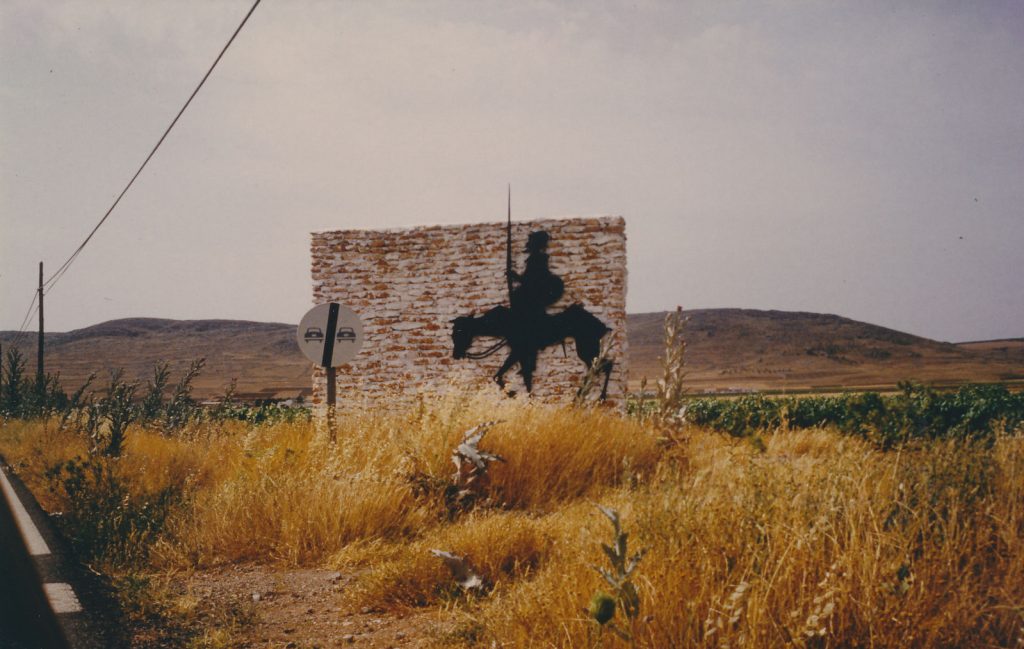Capítulo 1: Los Procesos Comerciales
1.7.2: Gramática-se pasivo/se impersonal
 Don Quijote de la Mancha – Wikimedia Commons – CC BY 3.0.Forming the passive voice with se.
Don Quijote de la Mancha – Wikimedia Commons – CC BY 3.0.Forming the passive voice with se.
In the passive voice in Spanish or English, the object from an active voice sentence becomes the grammatical subject. Please note, grammatical subject only means that the verb is conjugated to match-it doesn’t change who or what actually did the action. Let’s refer back to our original example:
- Elsa canta la canción. = active voice
- Se canta la canción. = passive voice
Elsa or someone still needs to sing the song but for some reason in the passive voice sentence we have decided to omit her and focus on the song.
Using an example from your reading, let’s see what an active version of the same sentence would look like:
- “En California se cultivan más de un centenar de variedades de uva”.
Who does this? Based on the given sentence, we don’t know. We can assume that it’s farmers, or people, or somebody. In this specific example, the who has been omitted because the focus is on being in California and the grapes that are cultivated. Who actually did the work isn’t the focus. If it were focusing on who did the work, we might see a sentence like this:
- “Los agricultores de California cultivan más de un centenar de variedades de uva”.
The passive voice only uses two conjugations: singular third person (él/ella) or plural third person (ellos/ellas).
- Se canta la canción
“Canta” is singular because canción is singular.
- Se cantan las canciones
In this case, “cantan” is plural because canciones is plural.
Using the examples from your readings, identify the subject of the verb for #4-8.
- “Se utilizaron muchos métodos para tratar de erradicar la filoxera”.
- “Su parte norte también se conoce como la Región Monterrey”.
- “En California se cultivan más de un centenar de variedades de uva“.
- “Se recoge información sobre el sector vitivinícola”.
- “Durante la campaña 2012/2013 se ha exportado vino por valor de 2.442,7 millones de €.”
- “Las grandes superficies comerciales se instalaban sobre todo a las afueras de las ciudades”.”
- “Hay varias razones por las cuales se prefiere comprar en los grandes supermercados en vez de en los ultramarinos de barrio”.
- “…favoreciendo que los consumidores se distribuyan uniformemente en toda la zona”.
As you can see in these examples, the passive voice can occur in any tense or mood.
Actividad 1:
Take the sentence below in the active voice and transform them into the passive voice using the passive se.
- El perro muerde al hombre
- La chica lee el libro.
- Las personas hablan del restaurante.
- Tomás levanta las manos.
- Marisol dice la respuesta.
Actividad 2:
Now, use these words and create sentences in the passive voice. You may have to add more words in order to make coherent sentences.
- minar/cobre/Chile
- vender/vino/bodega
- elaborar/queso manchego/La Mancha
- invertir/dinero/negocio
- aconsejar/venta
Actividad 3:
Now, use any three verbs from your vocab list to write passive voice sentences about industry in Spain or in the place where you are from or where you live now.
 Windmills in La Mancha – Wikimedia Commons – CC BY 2.0.
Windmills in La Mancha – Wikimedia Commons – CC BY 2.0.

